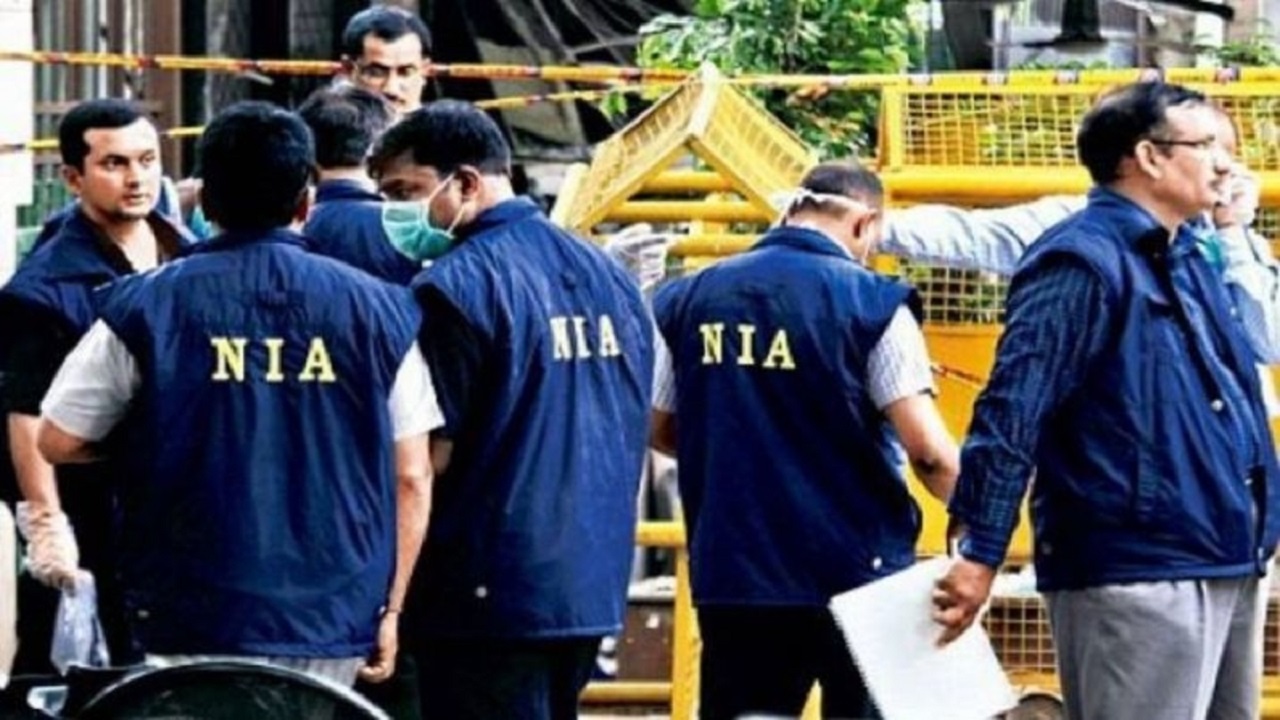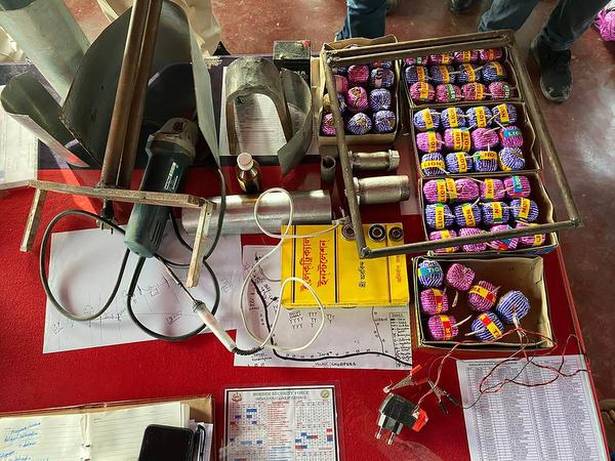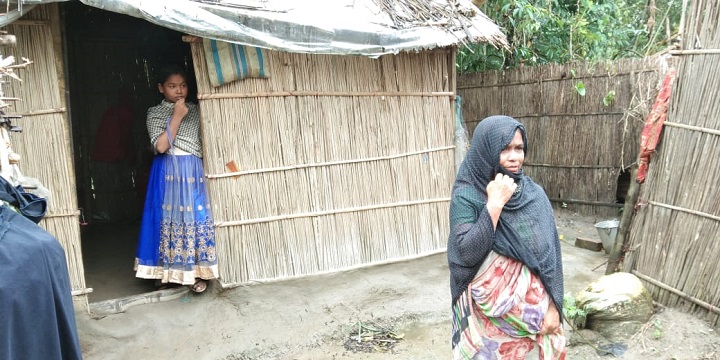The arrest of six persons by the National Investigation Agency’s (NIA) from different villages in Murshidabad district of West Bengal and three persons of the same district from Kerala on 18th September, allegedly for being a part of inter-state module of al-Qaeda operatives, planning to undertake terrorist attacks at vital installations in India with an aim to kill people and strike terror, created lot of sensation among the common public but has raised many questions among human right activists in the state.
The dramatic mid-night raids and arrests by NIA, the subsequent media trail, the vicious campaign to stigmatise and criminalize an entire community as sponsor of terrorism aimed to further accelerate the already communally polarised society and politics in the state, are alarming signs of things to come as West Bengal braces itself for election next year.
All that the NIA claimed to have recovered from those ‘dreaded terrorists’ were country-made pistols, batteries, switches, fire-crackers, a booklet on electrical installation and other “incriminating material”. A ‘secret tunnel’ found inside one of the accused house added sensation to the thrilling episode.
On 24th September, a fact-finding team on behalf of APDR (Association for Protection of Democratic Rights) visited the houses of the men arrested by the NIA in Murshidabad, for alleged association with Al Qaeda. The team was accompanied by members of AIPF (All India People’s Forum), AISA ( a left students organisation), Anti-NRC Solidarity Forum and a journalist from People’s Review. Given the importance of the incident, we have translated the fact finding report in English, which is given below. The original report in Bangla is attached at the end.
On the 24th September, an eleven member fact finding team riding motorcycle on dilapidated roads amidst rain first reached the house of Abu Sufian in Kali Nagar. Earlier, on the way, the team had approached a few local residents at the Dhultala crossing but they mostly refused to speak except for expressing their grudge against journalists for publishing exaggerated accounts of the incident in the media.
Abu Sufian’s house falls under the Rani Nagar Police Station. The team found that his family, terrorised by the NIA and the media, had locked themselves inside the house. Even the neighbours were traumatized by the terror created by the false media campaign. The fact-finding team had to spend a considerable amount of time to explain the purpose of their visit to the locals. Slowly, people began to open up; they informed us that Abu Sufian is a tailor and his father a school teacher. Abu Sufian lives in his ancestral house with his family. Due to bad financial conditions, Sufian’s 15 years old son (eldest) had to drop out from school and he put him to learn carpentry. By nature a peace-loving and religious man, Abu Sufian rarely stepped out of the village. The NIA and the media has claimed there was a hidden tunnel inside his house. The fact is, Abu Sufian was constructing a toilet inside his house. Since he did not have the money to employ a plumber, he himself had dug a chamber for the toilet. The four sides were covered by tin sheets, the roof of the toilet was still to be done. The secret ‘tunnel’ inside his house shown by the media was actually a pit dug for constructing a toilet chamber.
Abu Sufian has two brothers, he being the youngest among the three. He has four minor sons, the eldest being called Wasim Akram. Abu Sufian’s elder brother Jinnatul Islam teaches in the Panipia Madrasa and is associated with CPI (M). On Friday (18/09/20) after midnight, around 2:30 am (thus technically it was Saturday), Jinnatul was awakened from sleep by the noise of loud knocks on his door. He himself had opened the door when he heard that it was police who were knocking at his door. The raiding team slapped him several times and then enquired about his brother Abu Sufian, showing his photograph on their mobile phones. Jinnatul recognized his brother in those images. Meanwhile, the police climbed up the wall and entered Sufian’s house in the adjacent compound. They woke Wasim up, poking him with an umbrella stick like something from outside the window, while also kicking the door at the same time. As soon as they entered the room, they started slapping the young boy. Sufian’s wife Nur-un-Nisa hid in panic and Abu himself tried to run away, but was caught by the police which had surrounded the house. Other than being slapped and kicked, Abu was severely struck on his fingers and toes with a damat (wooden handle of a spade). Wasim’s brother is just 10 years old. Even he was pulled by his hair. According to Wasim, the raiding team consisted of about 30-40 persons, including a woman, two civic volunteers, a few policemen in plain clothes and the rest were BSF Jawans. None of them had their name or rank written on their dress. Sufian was picked up and taken to a BSF camp in Jalangi. Jinnatul was forced to accompany him. In the morning, he was given the bus fair and asked to go home. But before he left, he was made to sign some papers. Now, he and the entire family are saying that they are unable to find out where or how Abu is. The raiding team has confiscated some things from their house but has not given any seizure list.
22-23 years old Murshid Hassan lives in the same village, a little away from Abu’s house. His house is actually a tiny hut surrounded by a jute-stick fence. His parents live there. His father is unable to do any physical labour. They are dependent on the money that their son sent by working as a migrant labourer in Kerala. Murshid has been arrested by the NIA from Ernakulam in Kerala. After his arrest, a policeman in plain clothes came and informed Murshid’s mother at around 10 am in the morning that his son had been arrested by the Delhi Police, but he told nothing about why he had been arrested or where he had been kept. Murshid’s mother told us that both Murshid as well as she herself suffer from neurological disease. They have visited a doctor in Berhampore for treatment. The family is solely dependent on their eldest son Murshid’s earning. Since his arrest, the neighbours have been feeding the old couple. The neighbours told the fact-finding team in unison that Murshid can’t be a terrorist (“Murshid Santrasbadi hotei pare na”).
Najmus Sakib, residing in Hitanpur, has barely touched 22 years. He too has two siblings, he being the youngest. The eldest brother, Rijwan Ali emphasized that Sakib stepped out of the house only to go to the college; they have never seen any of Sakib’s friends visiting him at the house. Sakib is a second semester student, pursuing graduation in Computer Science and has always been bookish. He often suffers from thyroid, gallbladder stone and jaundice. Based on NIA media briefings, it was widely reported that the money for the terrorist network busted in Murshidabad used to come in Shakib’s bank account. Our enquiry found that Shakib has a joint savings deposit account with his father in Bank of India. This is Shakib’s only bank account. Rizwan, elder brother of Shakib showed us the passbook of the account. We didn’t notice any unusual transaction in the account. A sum Rs.1500 was deposited every month in the account under the ‘Yuvashree’ scheme of the state government.
He has a joint savings account with his father in the Bank of India and the fact-finding team did not find any unusual transaction in his bank passbook. A sum Rs.1500 was deposited in that account under the ‘Yuvashree’ scheme of the government. The police came to their house around 1:45am. Sakib opened the door on hearing the knocks, though the police had by then already entered the house through the terrace door. Rijwan was told in mixed Hindi and Bangla that Sakib would be taken away for some interrogation. He was made to give his signature on a few empty poly packs (polythene bags). He was not abused verbally or physically assaulted. The police took away the middle-brother Gaji Rahman’s old laptop, Sakib’s android phone along with the charger, his aadhaar card, pan card and all academic documents such as admit card, registration certificate, mark-sheets etc. No seizure list was given. In the morning, Rijwan was called over the phone and he went to the Domkal police station, all the cards were returned but not the academic documents. In the police station he was made to sign a few more empty poly packs. But he wasn’t given any information as to why Sakib was arrested. The raiding team in Najmus’s house too consisted of a woman police, two civic volunteers, BSF jawans and policemen in plain clothes – none of their uniforms displaying their name or rank.
Leu Yean Ahmed lived in the Old-BDO junction in Domkal. He lost his father at a very early age. His maternal uncle, Abul Kalam Azad, a Homeopathy doctor, took care of studies since then. After passing Higher Secondary Exams he trained as an electrician. He has a casual job of an electrician in Domkal College and he goes from house to house in Domkal to work as an electrician. He is now almost 36 years old, yet unmarried. His family comprises his widowed mother, elder sister separated from her husband and niece (sister’s daughter). Police raided his house at around 3 am after climbing down the boundary wall from the neighbor’s house. His motorbike that he bought 3 years back did not have any toolbox, but some tools needed for electrical repairs were in the house. The NIA team took those without providing a seizure list. They also pushed around his sister and old mother. She saw slap-marks on Ahmed’s cheeks also. His mother asked many times why her son was being arrested, to which the officers remained silent; neither did they inform where Leu Yean was being taken. His sister was made to sign a few blank forms. Even now, they do not know where Leu Yean Ahmed is and in what condition. They don’t know if they would be allowed to meet him. His sister accused the media of spreading lies and false stories.
Shamim Ansari, lived in Nowdapara, under Jalangi Thana. He is a mason by profession and is extremely poor. His mother is a weaver. They barely manage to survive. The state’s special task force entered his house and promptly picked him up. That team also included BSF Jawans and civilian dressed policemen from the local Thana. As in the other cases, their dresses too had no names or ranks tag on them. Also there were no policewomen in the team. No documents were provided against the arrest. Nothing was seized from the house. No signatures were taken.
Al Mamun Kalam, 35, used to live in the same village. He is a driver but at times he used to work as a mason. He has studied up to the 5th standard. The NIA team came to arrest him around 6 am. The house was searched but nothing was confiscated. No police women were present. The team did not answer any questions asked by the family.
Mainul Mondal, 29, lived in Madhubona, in Jalangi. He worked as a cook (frying Parotas) in Kerala. He came home during lockdown and could not go back. Yakub Biswas, 25, a casual labourer, has a little daughter and he was arrested in Kerala.
Mosaraf Hossain, 38, residing at North Ghoshpara, worked in a garment shop in Kerala. He was arrested from his workplace. His brother Atiyur Rahman, 28, is a student, he was at home in North Ghoshpara, Jalangi, when the NIA team, at around 2 am, broke the bamboo fence, forcibly entered the house and picked him up after abusing him verbally. His mobile phone, bank passbook, Aadhar card and voter ID card were confiscated without providing any record. There were no women in the team.
All those arrested are from the financially weaker section of the society, belonging to poor families. None have much of an influence in the locality they reside in. It seems they do not even mix much with others. Their traumatized and terrified families are too poor to seek legal recourse. Added to this, the continuous false propaganda by the media has scared the local residents.
The fact-finding team feels, however powerful the NIA might be from the 2008 Act and the subsequent amendments in 2010 and 2019, the agency has not given minimum respect to human rights. They have forcibly entered the houses at midnight by climbing boundary walls, verbally and physically abused the alleged accused persons and their family members, have not shown any search or arrest warrant signed by higher officials or the court, have refused to state the reason for the arrest, have forced the family members to sign empty poly-packs, forms and papers. Neither the arrested person nor his family was given any time to think before signing papers, and even after a week since the arrest, the families have not been informed of the whereabouts of the arrested persons. The officers of the agency did not display any name or ranks on their dress. The local police stations were fully aware of the raids by the NIA. The local political parties are keeping mum. The fact finding team from APDR has not found any hint or fact that the arrested persons may be involved in any terrorist and disruptive activities. From the enquiries made by the team at administrative level sources (an official unwilling to reveal his name) it is clear that even the police intelligence had no information about any ‘Al Qaeda terrorist’ in the area before the raids.
Even though the responsibility of maintaining law and order in the state lies with the State Government, in 2008, during left parties back congress government headed by Manmohan Singh constituted the NIA under the Union Home Ministry after the 2008 Mumbai attack. The NIA has branches in 33 Indian cities, Including Kolkata. After discussion with the Chief Justice of the Supreme Court, a few special courts were established to hear NIA cases. According to the 2019 amendment the agency can investigate organised crime committed abroad and charge them in court. Moreover, the latest amendment gave NIA the power to investigate and take necessary measures in cases of terrorist act, activities supporting terrorism, sedition, printing and distributing fake currency etc. It can do so not only without the permission of the State Government but also without even informing it. The 2008 Act and the 2010 amendment allowed NIA only to investigate into organized crime, but the 2019 amendment by the BJP government empowered it to even look into individual crimes. However, till date, the ‘terrorist’ activities and activities against ‘national interests’ have not been defined.
The NIA though have arrested many as ‘terrorists’, its past record shows that despite so much power it has been unable to prove the charges in courts leading to acquittal of the accused. The accused had to spend 10-14 years in prison before being declared innocent by the courts.
NIA is a central agency. The BJP IT Cell has been consistently spreading false propaganda (mostly communal and fascist) against the two states – West Bengal and Kerala, from where these arrests have been made. According to a report in The Wire, more than 30 propaganda websites have been launched by the IT cell with the purpose of communally polarising West Bengal before the 2021 state election. The mainstream media in West Bengal have now joined them. NIA directly interferes in the rights of the state governments.
Our demands:
- The CM must immediately interfere in the matter of NIA raids in the state.
- The black laws like UAPA (Unlawful Activities Prevention Act) and NSA (National Security Act) must be repealed immediately along with the National Investigation Agency(NIA) Act.
- In the case of arrest of an earning member of the family, the government must take responsibility for the needs of those families.
- The State Government must appoint efficient lawyers to fight cases in favour of the arrested persons.
- The NIA officials accused of physically assaulting the arrested persons and their families and forcing them to sign on blank papers must be identified and punished.
- Each case of arrest by the NIA, should be investigated by an independent citizens’ committee, having a retired Judge in it as a member.
- It must be explained why the local police accompanied the NIA during the illegal mid-night raids.
- The families of the arrested persons must be informed about where they are detained and in what condition they are. At least, a weekly meeting of the arrested with their respective family members must be arranged.
- Entry of forces in any house after sunset and before the next sunrise should be strictly banned.
- Permission must be sought from the women in the house before entering.
Milan Malakar, President, APDR Berhampore;
Matiyur Rehman, President, APDR Domkal
Dated: 29-9-2020
The original APDR report (in Bangla):
[pdf-embedder url=”https://www.groundxero.in/wp-content/uploads/2020/10/092020-1.pdf”]




